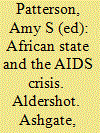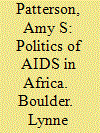|
|
|
Sort Order |
|
|
|
Items / Page
|
|
|
|
|
|
|
| Srl | Item |
| 1 |
ID:
068072


|
|
|
|
|
| Publication |
Aldershot, Ashgate, 2005.
|
| Description |
xiii, 240p.
|
| Series |
Global health
|
| Standard Number |
0754639673
|
|
|
|
|
|
|
|
|
|
|
|
Copies: C:1/I:0,R:0,Q:0
Circulation
| Accession# | Call# | Current Location | Status | Policy | Location |
| 050945 | 362.1969792096/PAT 050945 | Main | On Shelf | General | |
|
|
|
|
| 2 |
ID:
155483


|
|
|
|
|
| Summary/Abstract |
Based on 16 months of fieldwork conducted in Malawi and Zambia between 2005 and 2014, this article advances debates on North–South relations by providing an actor-oriented view of donor politics. Drawing upon 152 interviews, 104 focus group discussions and a series of observations, it demonstrates how local people instrumentalize the fuzziness of ‘empowerment’ discourses to gain resources, status and opportunities. Our analysis of how local people push back against top-down dictated policies and structures in international affairs is highly pertinent because of Africa's extreme dependency on external resources for the AIDS response. We argue that the malleability of ‘empowerment’ in the AIDS enterprise has strategic advantages for seemingly dependent people living with HIV. Through ‘performances of compliance’ that mimic dominant ideologies, ‘extraversion’ that plays up recipients' weakness in global structures, and silence and humour that extend beyond the limits of the spoken word, locals embrace the elasticity of ‘empowerment’ and show agency despite the constraints of poverty, aid dependence, hunger and unemployment. These actions close the space for actual transformation of local people's lives because they create power imbalances within communities, privileging some while silencing and disadvantaging others.
|
|
|
|
|
|
|
|
|
|
|
|
|
|
|
|
| 3 |
ID:
145179


|
|
|
|
|
| Summary/Abstract |
Many studies have examined the significant involvement of Christian organizations in national-level politics since the revitalization of democracy in Africa in the 1990s, but few have focused on local faith-based organizations engaged in grassroots citizen mobilization. This article compares two such organizations rooted in local communities in Zambia and South Africa in order to elucidate their role. On the basis of interviews, document analysis, and participant observations conducted in 2011, 2013, and 2014, we find that the greater the autonomy a Pentecostal organization enjoys from external partners and the more independence its leader enjoys in decision making, the more likely it is to engage in local citizenship mobilization. However, while these structural factors may facilitate change, they are unlikely to result in new political strategies being pursued unless they are combined with a form of visionary leadership that seeks to promote citizenship. Our findings explain new forms of Pentecostal political involvement, particularly at the grassroots level, by showing how some leaders have used their churches' autonomous structures to promote political engagement.
|
|
|
|
|
|
|
|
|
|
|
|
|
|
|
|
| 4 |
ID:
075189


|
|
|
|
|
| Publication |
Boulder, Lynne Rienner Publishers, 2006.
|
| Description |
xii, 226p.
|
| Standard Number |
1588264777
|
|
|
|
|
|
|
|
|
|
|
|
Copies: C:1/I:0,R:0,Q:0
Circulation
| Accession# | Call# | Current Location | Status | Policy | Location |
| 051979 | 362.1969720096/PAT 051979 | Main | On Shelf | General | |
|
|
|
|
| 5 |
ID:
180346


|
|
|
|
|
| Summary/Abstract |
Trust between actors is vital to delivering positive health outcomes, while relationships of power determine health agendas, whose voices are heard and who benefits from global health initiatives. However, the relationship between trust and power has been neglected in the literatures on both international politics and global health. We examine this relationship through a study of relations between faith based organisations (FBO) and donors in Malawi and Zambia, drawing on 66 key informant interviews with actors central to delivering health care. From these two cases we develop an understanding of ‘trust as belonging’, which we define as the exercise of discretion accompanied by the expression of shared identities. Trust as belonging interacts with power in what we term the ‘power-trust cycle’, in which various forms of power undergird trust, and trust augments these forms of power. The power-trust cycle has a critical bearing on global health outcomes, affecting the space within which both local and international actors jockey to influence the ideologies that underpin global health, and the distribution of crucial resources. We illustrate how the power-trust cycle can work in both positive and negative ways to affect possible cooperation, with significant implications for collective responses to global health challenges.
|
|
|
|
|
|
|
|
|
|
|
|
|
|
|
|
| 6 |
ID:
168424


|
|
|
|
|
| Summary/Abstract |
Even though most African states have signed and ratified the Framework Convention on Tobacco Control (FCTC), a global treaty to limit tobacco use, African states have been slow to pass and implement tobacco control policies like regulations on sales, smoke-free environments and taxes. This article examines how the ineffectiveness of local tobacco-control advocacy contributes to this suboptimal outcome. It asserts that the disconnect between the global tobacco-control advocacy network and local advocates shapes this ineffectiveness. With funding and direction predominately from the Bloomberg Initiative, local advocates emulate the funders' goal of achieving quick, measurable policy results. Their reliance on the network drives African advocates to strive to pass legislation, even in difficult political climates, and to remake their agendas when funders change their priorities. They also emulate the network's focus on evidence-based arguments that stress epidemiological data and biomedical interventions, even when this issue frame does not resonate with policy-makers. Financial dependence can draw local advocates into expectations about patronage politics, undermine their ability to make principled arguments, and lead them to downplay the ways that their home country's socioeconomic and cultural contexts affect tobacco use and control. Based on key informant interviews with African advocates, media analysis and the case-studies of Ghana and Tanzania, the article broadens the study of philanthropy in global health, it adds an African perspective to the literature on global health advocacy, and it deepens knowledge on power dynamics between external funders and local actors in the realms of health and development.
|
|
|
|
|
|
|
|
|
|
|
|
|
|
|
|
|
|
|
|
|